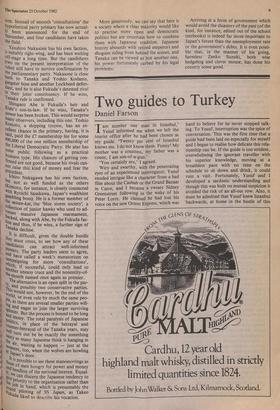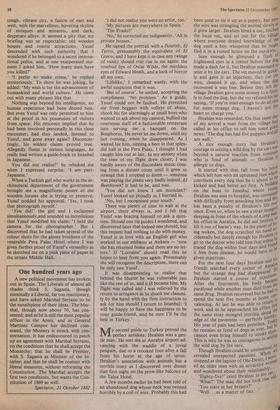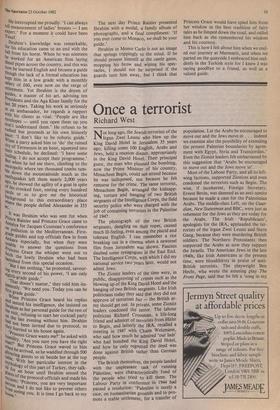Two guides to Turkey
Daniel Farson
am number one man in Istanbul,'
Yusuf informed me when we left the tourist office after he had been chosen as my guide. `Twenty per cent of Istanbul knows me. I do not know them. Funny! My mother was a countess, my father was a count, I am son-of-a-gun.'
`You certainly are,' I agreed. Wiry and swarthy, with the penetrating eyes of an experienced interrogator, Yusuf exuded intrigue like a character from a bad film about the Casbah or the Grand Bazaar in Cairo, and I became a sweaty Sidney Greenstreet following in the wake of his Peter Lorre. He claimed he had lost his voice on the new Orient Express, which was hard to believe for he never stopped talk- ing. To Yusuf, interruption was the spice of conversation. This was the first time that a guide had been laid on especially for myself and I began to realise how delicate this rela- tionship can be. If the guide is too strident, overwhelming the ignorant traveller with his superior knowledge, moving at a breathless pace with no time on the schedule to sit down and drink, it could ruin a visit. Fortunately, Yusuf and I developed a sardonic understanding and though this was built on mutual suspicion it avoided the risk of an all-out row. Also, it must be admitted that Yusuf knew Istanbul backwards, at home in the hustle of this tough, vibrant city, a fusion of east and west, with the marvellous, hovering skyline of mosques and minarets, and dark, desperate alleys. It seemed a pity that my briefing was so respectable: old wooden houses and tourist attractions. Yusuf descended with such authority that I wondered if he belonged to a secret interna- tional police, and at one exasperated mo- ment I asked him, 'How many men have you killed?'
`I prefer to make crime,' he replied mysteriously. To show he was joking, he added: 'My wish is for the advancement of humankind and world culture.' He came out with many phrases like that.
Nothing was beyond his intelligence, no human experience had been denied him. But even Yusuf was only permitted to hint at the proof in his possession of visitors from space. His reticence implied that he had been involved personally in this close encounter; had they landed, listened to Yusuf, and gone away again? Disconcer- tingly, his wildest claims proved true. Allegedly fluent in sixteen languages, he really had written a guide-book to Istanbul in Japanese.
You did not realise?' he rebuked me when I expressed surprise. 'I am part- Japanese.'
When a Turkish girl who works in the ar- chitectural department of the government brought me a magnificent poster of the wooden houses she is trying to preserve, Yusuf nodded his approval: 'Yes, I took that photograph myself.'
`You did!' the girl and I exclaimed simultaneously,and sounded so incredulous that Yusuf modified his claim: 'I held the camera for the photographer.' But I discovered that he had taken several of the colour shots for the glossy brochure of the venerable Pera Palas Hotel where I was given further proof of Yusuf's versatility as he sketched me on a pink piece of paper in the ornate Middle Hall.
'I did not realise you were an artist, too.' `My pictures are everywhere in Spain.' `The Prado?'
'No,' he corrected me indignantly. 'All in private houses.'
He signed the portrait with a flourish, El Turco, presumably the equivalent of El Greco, and I have kept it in case any twinge of vanity should ever rise in me again: the rosebud lips of Oscar Wilde, the mirthless eyes of Edward Heath, and a look of horror all my own.
`Lifelike,' I remarked wanly, with the awful suspicion that it was.
`But of course', he smiled, accepting the compliment. 'No problem.' As a guide, Yusuf could not be faulted. He protected me from beggars with volleys of abuse, shook his fist alarmingly at small boys who wanted to ask about my camera, bullied the courteous staff of a fashionable restaurant into serving me a banquet on the Bosphorus. He never let me down, until my last evening, when he disappeared. As I waited for him, sipping a beer in that splen- did hall in the Pera Palas, I thought I had caught him out at last. In my anxiety when the time of my flight drew closer, I was hardly aware of the discordant music com- ing from a distant room until it grew so strange that I stopped to listen — someone was playing the piano very badly indeed. El Beethoven? It had to be, and was.
`You did not know I am musician?' Yusuf looked up proudly as I hurried in. `No, but I recognised your touch.'
There was plenty of time to wait at the airport, there always is, and I felt that Yusuf was bracing himself to .ask a ques- tion. Should one tip guides I wondered, and discovered later that indeed one should, but this request had nothing to do with money. Yusuf is in love with an English girl who worked in our embassy at Ankara — 'now she has returned home and there are no let- ters.' If 'Lorraine' should read this he hopes to hear from you again. Presumably she will recognise the description, there can be only one Yusuf.
It was disappointing to realise that behind the bluster he was vulnerable just like the rest of us, and it ill became him. My flight was called and I was relieved by the return to arrogance as he shook me clammi- ly by the hand with the firm instruction to ask for him should I return to Istanbul: 'I will be happy to have the happiness to be your guide-friend, and be sure I'll be the best in Turkey.'
My second guide to Turkey proved the perfect antidote. Ibrahim was a gen- tle man. He met me at Antalya airport ad- vancing with the waddle of a jovial penguin, due to a crooked foot after a fall from his horse at the age of seven. Ibrahim's association with animals has a terrible irony as I discovered over dinner that first night on the prow-like balcony of the Talya Hotel.
A few months earlier he had been told of an abandoned dog whose neck was twisted horribly by a coil of wire. Probably this had
been used to tie it up as a puppy, but now the wire was strangling the animal slowly as, it grew larger. Ibrahim hired a car, fetched the local vet, and set out for the village where everyone denied knowledge of the dog until a boy whispered that he might find it in a ruined house on the outskirts. Sure enough he glimpsed a flash of frightened eyes in a corner before the dog made a dash for it, but Ibrahim managed to seize it by the ears. The vet moved in quick- ly and gave it an injection; they cut the wire, cleaned it up, and when the clog recovered it was free. Before they left the village Ibrahim gave some money to a fallli" ly to feed the dog, but the vet refused his fee saying, 'If you're mad enough to do all this for some strange dog, I haven't got the heart to charge you.' Ibrahim was rewarded. On that same daY of my arrival a man from the village had, all are at his office to tell him some go°_,u, news: 'The dog has had five puppies and are well.' A nice enough story but Ibrahim's courage in seizing a wild dog by the ears Was beyond a natural reaction from someone who is fond of animals — Ibrahim 15 allergic to dogs. It started with that fall from his horse which left him with an upturned foot which convinces every dog that he is about to be kicked and had better act first. A bulldog on the boat to Istanbul where Young Ibrahim was sent to hospital, was restrained with difficulty from attacking him and till, has been a penalty of Ibrahim's life eve since. Even so, when he saw a stray inohgr,et sleeping in front of the wheels of a jeep rie",c) his office in Antalya, he did not hesitate lift it out of harm's way. In the panic of be ing woken, the dog scratched his hand ac' cidentally but deeply enough for Ibrahim!'" go to the doctor who told him that unless he, traced the dog within four days and foun° given injections. tiodniss.ease, he would have to bw
his
For the next four days Ibrahim an 3 friends searched every corner of Antalit) but the strange dog had disappeared. Ibrahim started a course of injection After the fourteenth his body beeathe paralysed while another man died froril, to same drug. Ibrahim recovered but he hau,, spend the next five months at home cu. valescing. At last he was able to return "0, work and as he approached his Office stuhe the same stray mongrel trotting along• edge of the pavement — perfectly healt,i'a'y His year of pain had been pointless. To he he remains as fond of dogs as ever, bto cannot even bring himself to stroke tn. `,„a This is why he was so courageous in
the wild dog by the ears.
revealed Tho ug hu Inberxaphei unexpected ecoulda passions. t mwehnetnalo,;1 ce, stopped at the lagoon of Olu-Deniz, 111_0 ed an older man with an attractive vin"' and wondered about their relationship' `Eighty-five!' cried Ibrahim in my ear.
`What?' The man did not look that `You stare at her breasts?'
'Well ...as a matter of fact..'
He interrupted me proudly. 'I can always tell measurement of ladies' breasts — I am expert.' For a moment it could have been Yusuf.
Ibrahim's knowledge was remarkable, for his education came to an end with the fall from his horse. When he was nineteen he worked for an American firm laying diesel pipes across the country, and this was how he learned English and became a guide though the lack of a formal education has kept him in a low grade with a monthly salary of £60, even now on the verge of retirement. Yet Ibrahim is the doyen of guides, a master of his art, advising ten Presidents and the Aga Khan family for the last 20 years. Taking his work as seriously as an ambassador, he regards a rapport With his clients as vital: 'People are like Aenvelopes — until you open them up you unn't understand them.' He refuses to be rushed but proceeds at his own leisurely Pace: `I don't like to be robotic guide.' When a party asked him to 'do' the ruined City of Termessos in an hour, squeezed into their schedule, he declined: 'I have some fheeling. I do not accept their programme.' unt when he led me there, climbing to the necropolis where ten thousand tombs tum- ble down the mountainside much as the earthquakes left them nearly 2,000 years ago, he showed the agility of a goat in spite °f his crooked foot, resting every hundred Yards or so to give me the historical vv°a.ekground to this extraordinary place nere the people defied Alexander in 333 Prince It was Ibrahim who was sent for when 'rince Rainier and Princess Grace came to „ArltalYa for Jacques Cousteau's conference 'II Pollution in the Mediterranean. First- de guides guides and top officials flew in from Ankara especially, but when they were to answer the questions from inucess Grace the whisper went out to beteh the lowly Ibrahim who had been 41,11shed from this special occasion. in But I am nothing,' he protested, savour- jg every second of his power, 'I am only 8ihth-grade guide.' T. hat doesn't matter,' they told him im- lf!atiently. 'We need you. Today you can be Ist-grade guide.' a When Princess Grace heard his replies thnd sensed his intelligence, she insisted on eahin't as her personal guide for the rest of visit, refusing to start her cocktail party rIn the last evening without him. Ibrahim not been invited due to protocol, so they hurried to his house again. 1. Princess Grace wants me?' he asked with 'Are you sure you have the right wan? But Princess Grace waved to him Dph en he arrived, so he waddled through 500 tattering guests to sit beside her at the to )ti 111,,,t: With her particular interest in the etiT°10gY of this part of Turkey, they talk- `0r an hour until Ibrahim sensed the e:res a the protocol officials and made his Gerson `Princess, you are very important frors°n and I do not like to prevent others k In seeing you. It is time I go back to my
The next day Prince Rainier presented Ibrahim with a medal, a family album of photographs, and a final compliment: 'If you ever come to Monaco, we shall be your guide.' Ibrahim in Monte Carlo is not an image that springs trippingly to the mind. If he should present himself at the castle gates, mopping his brow and wiping his spec- tacles, I should not be surprised if the guards turn him away, but I think that Princess Grace would have spied him from her window in the best tradition of fairy tales as he limped down the road, and called him back as she remembered his wisdom and his courtesy.
This is how I felt about him when we end- ed our journey at Marmaris, and when we parted on the quayside I embraced him sud- denly in the Turkish style for I knew I was saying goodbye to a friend, as well as a valued guide.












































 Previous page
Previous page